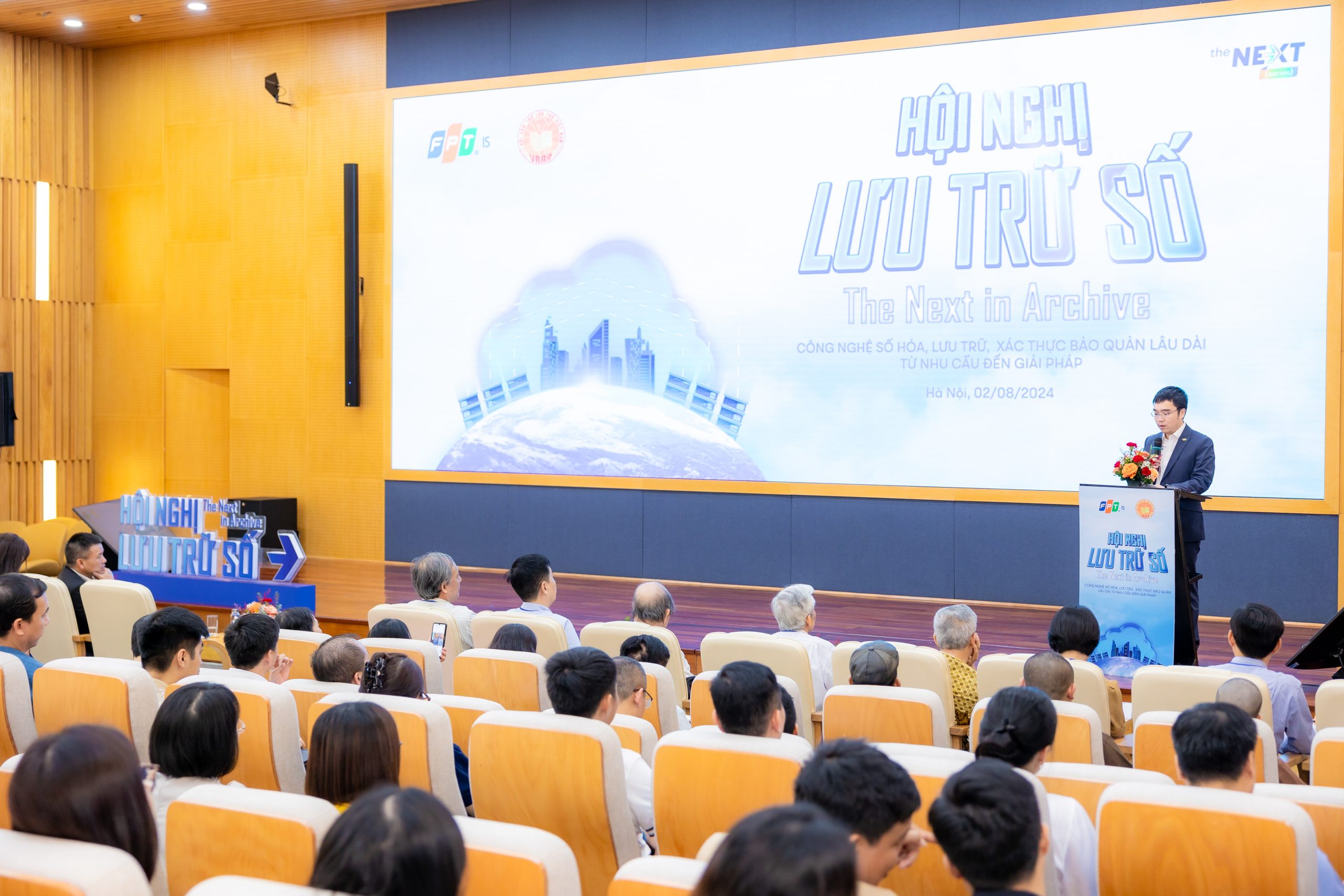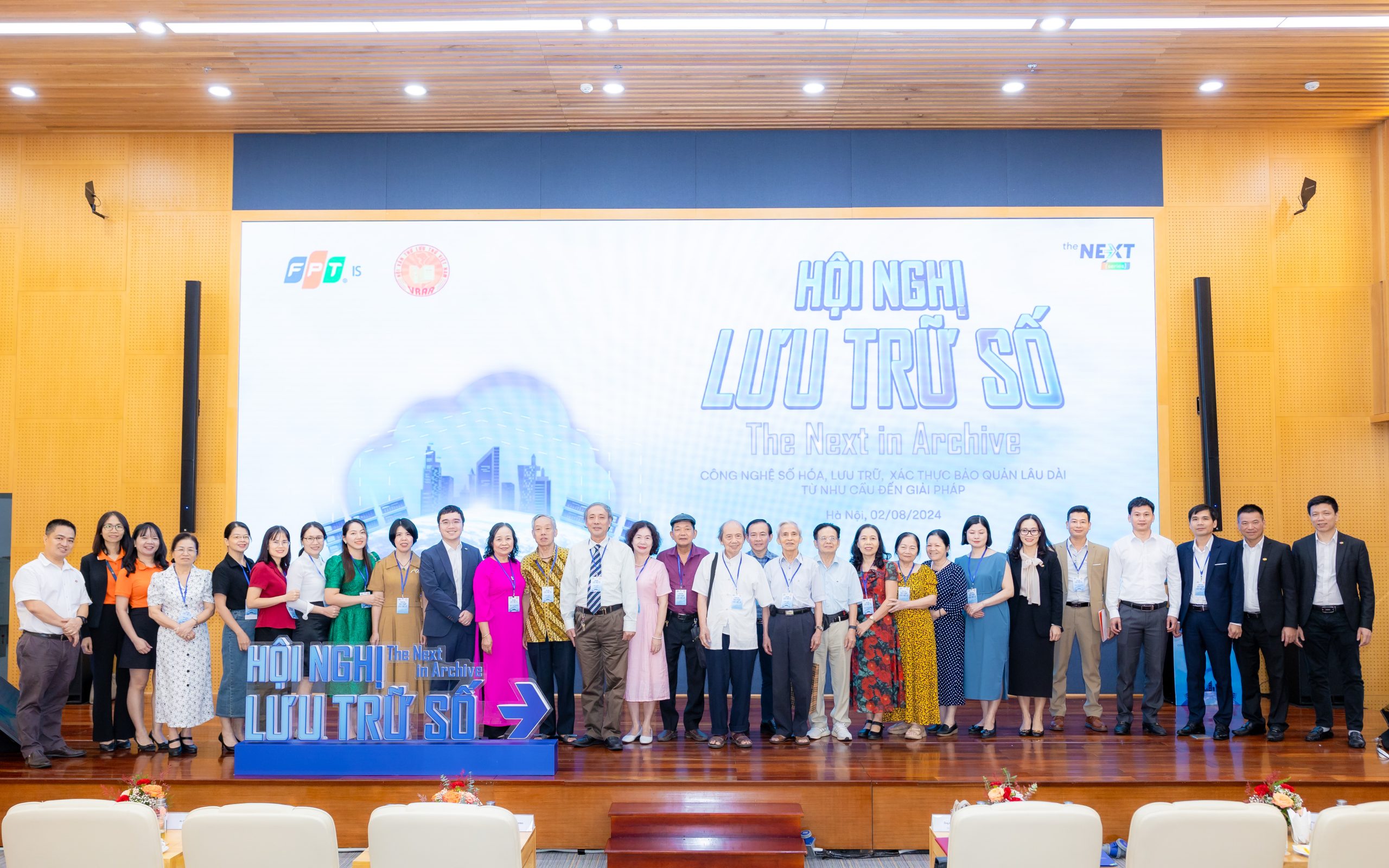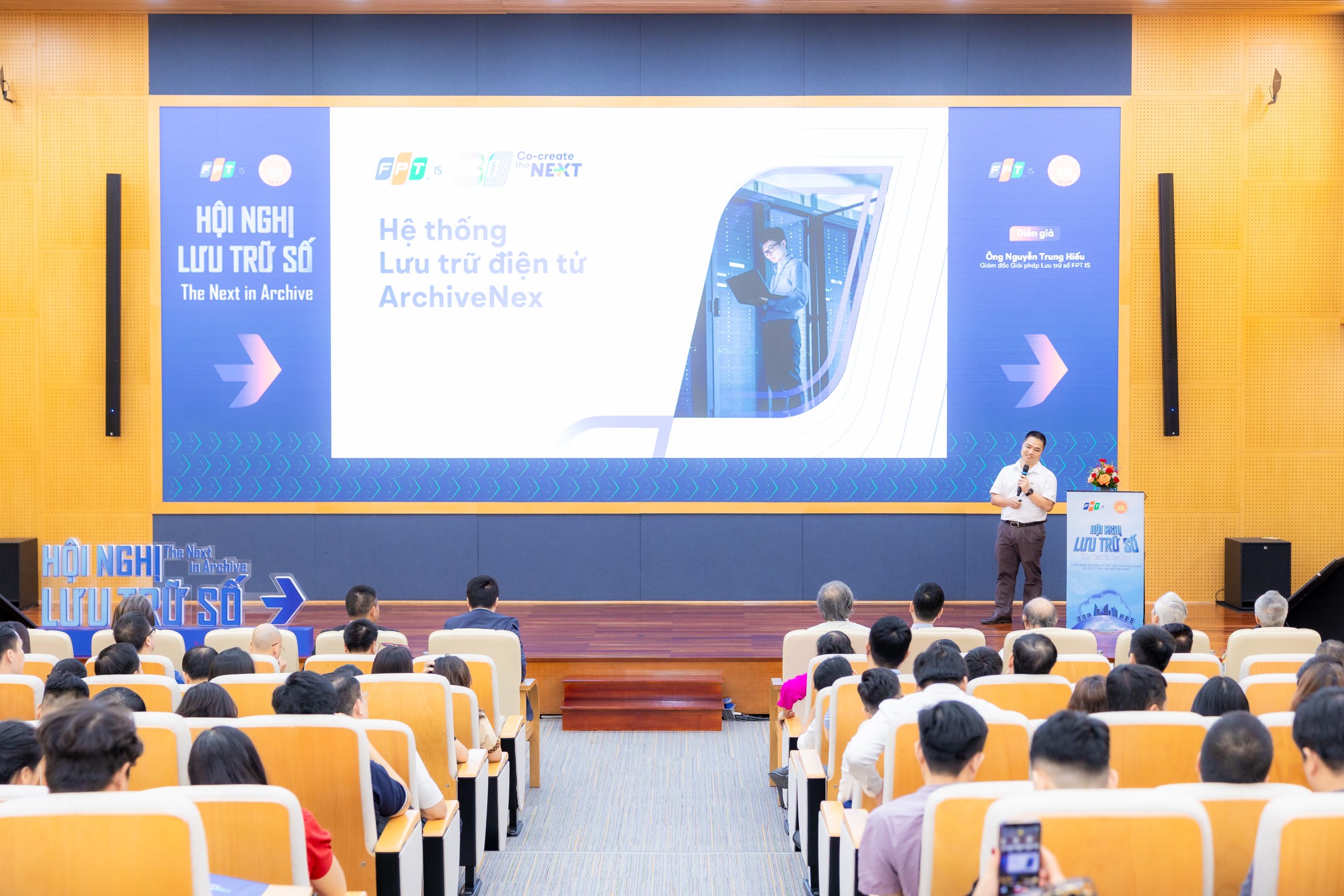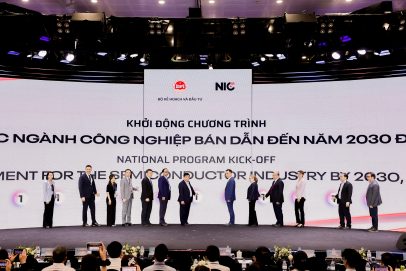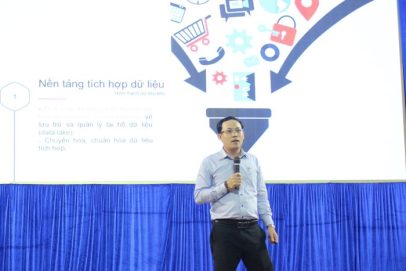Specialized and technological companies cooperate on solutions for Digital Archives – preparing for the implementation of the amended Law on Archives 2024
In response to the recently passed Law on Archives (amended) 2024 by the National Assembly, the Digital Archives conference – The Next in Archive – was organized by the Vietnam Association of Records and Archives and FPT IS. With professional support from the State Records Management and Archives Department, the event aimed to provide comprehensive insights and solutions that bridge both expertise and technology.
Nearly 300 delegates, including leaders from central and local archival agencies, corporations, state-owned enterprises, provincial and city archival centers, and researchers, attended the conference.
Co-hosted by a national archives unit and a leading technology firm, the conference attracted nearly 300 delegates, including leaders from central and local archival agencies, corporations, state-owned enterprises, provincial and city archival centers, and researchers. This is regarded as a pioneering event in preparing to meet the requirements of the newly passed Law on Archives (amended) No. 33/2024/QH15 by the National Assembly, which will take effect on July 1, 2025. The law necessitates significant preparations and comprehensive changes in archival practices across all relevant organizations.
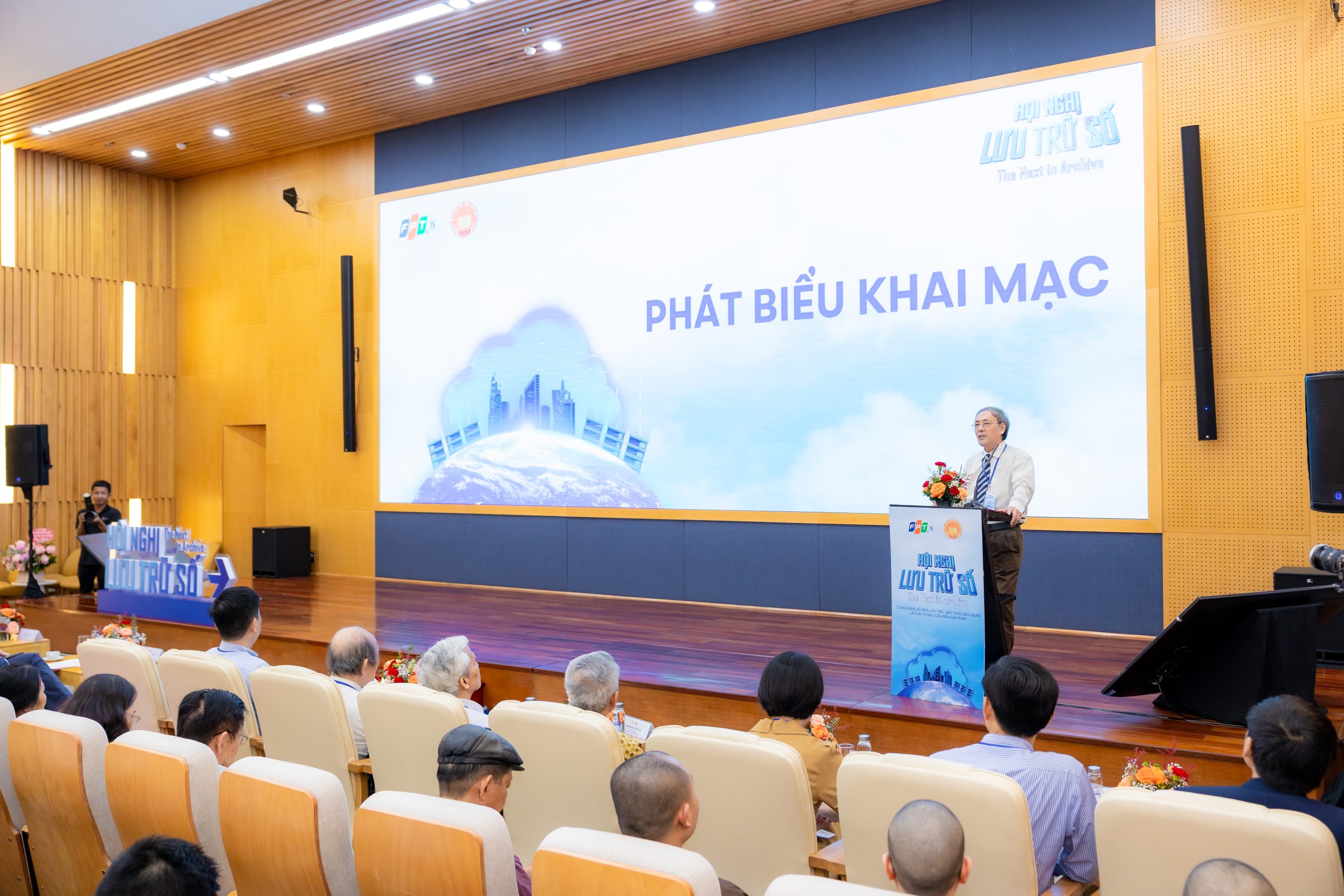
“Digital archiving is a mandatory journey with no alternatives”
That was the assertion from Mr. Dang Thanh Tung, Director of the State Records Management and Archives Department, during his speech at the conference. He noted, “This is the first national conference regarding the implementation of the amended Law on Archives 2024. The most challenging aspect of the law is digital archiving. It is an essential task for agencies, organizations, and individuals in the context of digital transformation as it ensures the preservation of legal evidence of their activities and storage of valuable information for future generations. Digital archiving is a mandatory journey with no alternatives.”
Mr. Tung’s affirmation is particularly relevant amid Vietnam’s significant digital transformation and the rapid development of information and communications technology. The huge volume of data generated daily underscores the urgent need for a modern, effective archiving solution to replace traditional methods, which are vulnerable to risks such as document degradation and damage, leading to loss, and no possibility of recovery. The amended Law on Archives 2024, which sets higher standards for digital document management of the Government, serves as a “wake-up call” for businesses and organizations to promptly act.
“With the rapid development of science and technology, our State imposes new requirements on managing, safeguarding, and promoting the value of archival documents and national archival sets of Vietnam. Therefore, we believe that digital transformation in archiving activities across our State and within every organization is urgent and cannot be delayed. However, it must be practical, effective, and feasible, built on a foundation of clear legal frameworks, compatible technological and technical infrastructure, and a workforce ready to meet the demands of digital transformation in both current and future records and archives.” – Mr. Hoang Quoc Tuan, Chairman of the Vietnam Association of Records and Archives shared his insights on the situation and requirements of current digital archives.
Regarding national archives issues, delegates discussed the national digital archives platform which was implemented by the State Records Management and Archives Department in collaboration with FPT IS. Built on the Open Archival Information System (OAIS) model following modern international standards, and the ArchiveNex solution which was researched and developed by FPT IS, the platform is considered a reliable and comprehensive solution for Vietnam’s digital archiving challenges.
Mr. Dang Thanh Tung acknowledged FPT IS’s contributions: “I commend FPT IS for its efforts in overcoming difficulties and challenges while collaborating with state agencies to “grope” for taking the first step in establishing the national digital archives platform over the past two years. Despite the complex challenges at the time, FPT IS’s cooperation was a bright spot, marking an important initial step which gave us confidence that by working together, we can not only achieve our goals but also advance further.”
Mr. Nguyen Hoang Minh, Chief Executive Officer of FPT IS, the firm deploying the national digital archives platform, spoke at the conference.
Mr. Nguyen Hoang Minh, Chief Executive Officer of FPT IS, the firm deploying the national digital archives platform, shared his insights: “Digital transformation in particular, and digital archiving in general, have become indispensable for the growth of every organization and economy, especially considering that the number of archived documents is projected to increase by 1,000 times by 2050. The new Law on Archives marks a turning point in shaping and managing the national digital archives system. In this context, FPT IS is proud to be a pioneer in researching and adopting the OAIS standard to archival management in Vietnam. Additionally, FPT IS thoroughly understands the challenges faced by localities, organizations, and businesses in implementing the amended Law on Archives 2024. We are committed and prepared to support these entities in adopting effective technology for digital archiving, not only to meet legal requirements but also to develop solutions for common challenges in digital government and digital nation.”
New provisions of the Law and newly posed challenges
Regarding the topic “The amended Law on Archives 2024 and the requirements for digital archives”, Dr. Nguyen Thi Chinh, Head of Records and Archives Management II at the State Records Management and Archives Department, analyzed the key provisions and new elements in the law. She highlighted the clear regulations and foundational aspects of digital archiving needed to meet the requirements of digital transformation. They include regulations on archival databases, digital archives, and technical standards, which will serve as a framework for organizations and businesses to understand and implement. “Regulations on digital archives are essential for ministries, departments, and localities to implement digital archiving. This specialized data warehouse consists of three key components: technical infrastructure, software system, and archival database. The software system, in particular, is designed to manage the collection, classification, statistics, value assessment, preservation, and utilization of digital archival documents, as well as archival database management. In terms of standards, digital archival packages must comply with SIP (Submission Information Package), AIP (Archival Information Package), and DIP (Dissemination Information Package) standards, along with the OAIS model of the national archives system. Entities must thoroughly understand these standard regulations to select appropriate technology solutions and implement standardized digital archives systems,” emphasized Ms. Chinh.
Assessing the outstanding challenges and issues in digital archiving, Ms. Chinh noted that while there has been a solution for the national digital archives platform, significant pressing problems persist for organizations and businesses. She pointed out that many organizations currently lack digital archiving systems, or records and documents have been digitalized but cannot be effectively utilized. Other issues can be listed such as security, archiving duration, and appropriate archiving technology.
From this perspective, discussing the needs and challenges of implementing digital archives as commented by branches/members of Vietnam Association of Records and Archives, Associate Professor Dr. Vu Thi Phung, Vice President of the Association, highlighted several concerning issues. During her visits to local branches and surveys of archiving work just a week ago, she was “shocked” to find archives still filled with paper documents covered in dust without viable solutions in sight. Ms. Phung noted that awareness of digital archives remains limited and confusing within organizations. The implementation of digital archives is not unified between technological and specialized departments. Due to limited professional qualifications, human resources, and budgets for archiving activities, problems with data entry, editing, digitization, and security authentication, as outlined in the amended Law on Archives 2024, are significant challenges that require timely action and preparation.
A number of delegates, who are experts in archiving and technology industries, attended the event.
Professional and technological solutions
The amended Law on Archives 2024 initiates a comprehensive transformation in archival practices, particularly focusing on digital archiving and technological integration. At the conference, FPT IS, a technology partner with 30 years of experience addressing national and local challenges, presented technological insights and introduced solutions for the long-term preservation of records and documents with digital signatures, and digital archives adopting the ArchiveNex solution and the iSoma data digitization solution.
Mr. Nguyen Trung Hieu, Product Owner of ArchiveNex, spoke at the conference.
Mr. Nguyen Trung Hieu, Product Owner of ArchiveNex at FPT IS, stated: “Despite the growing interest in digital archives, most organizations lack a digitalization and archival management system with an architecture that meets three essential objectives: safe storage, long-term preservation, and effective utilization. Additionally, there is no unified architecture to create a sharing platform that maximizes the value of archived documents and records. To address these challenges, FPT IS developed ArchiveNex, based on our experience in building the national digital archive platform, ensuring compliance with the OAIS model – ISO 14721:2012 standards. Furthermore, FPT IS has a deep understanding of issues related to digital data warehouses, digital government systems, and digital transformation at the ministerial level.”
Specially, ArchiveNex provides comprehensive support, starting from data reception, extraction, information editing, helping organizations effectively manage and store long-term records, to utilization and transmission of information both within sectors and across large organizations. Agencies, organizations, and businesses can easily transition to digital archives with absolute safety and security, ensuring quick and accurate information searching and accessing. The solution offers high recovery rates and compatibility with different systems through NAS, SAN, API, and S3.
To ensure that archival data is correctly digitized from the source, FPT IS is prepared to implement the data digitization solution – iSoma. This solution digitalizes paper documents, images, sound files, and digital copies of cultural heritage on various scales. It provides comprehensive digital processing services, from analyzing archival needs to creating content using the most advanced AI technologies. The output data can be delivered in multiple formats, including printed publications, documents on electronic devices, both web-based and virtual reality environments.
Regarding authentication and permanent preservation of the digital archived documents with digital signatures, MSc. Nguyen Anh Tu, Director of the Technical Support Center at the Department of Digital Authentication and Information Security, Government Cipher Committee, explained that, based on current legal regulations, the actual use of records and documents, and the implementation of digital signatures in Vietnam, the Committee has developed and implemented a solution to ensure the integrity, authenticity, and long-term existence of authenticated data objects. On the current ArchiveNex digital archiving system, which can be feasibly applied to both current and historical archives, authentication evidence has been included in archival information packages (AIP), using the solution of the Government Cipher Committee to ensure the legality and safety of archived information, as well as long-term preservation, in accordance with ISO 14533-4:2019 standards.
Delegates visited the Made by FPT IS archiving technology exhibition.
At the event’s exhibition area, FPT IS showcased a range of archiving technology solutions, including: the “Digital twin” solution, from the suite of 3D and virtual reality solutions (akaVerse) leveraging latest technologies in preserving historical and cultural items; the data digitization solution (iSoma); the legal document management software (FPT.LDMS), the digital archiving solution (ArchiveNex); and the digital office system (d-Office). Together, these technologies create a comprehensive software system meeting digital archiving regulations.
Attendees visited the Made by FPT IS technology exhibition and experienced the solutions.
With insights from managers, professionals, and technologists, the conference paved the way for new and effective approaches to archival practices across the country. In the coming time, the Vietnam Association of Records and Archives, the State Records Management and Archives Department, and pioneering technology companies like FPT IS will continue to offer specific guidance and solutions, and co-create values to make changes, contributing to the nation and localities in the spirit of The Next in Archive.



